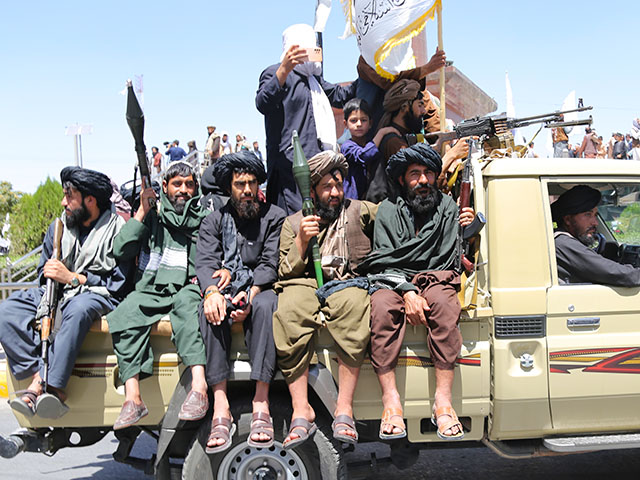‘Inclusive’ Taliban: Journalists Taking Pictures ‘a Major Sin’
A senior leader within the Taliban terrorist organization complained in public remarks that cameramen working for news organizations were allegedly violating Islamic law by taking pictures and videos, Afghan media outlet Tolo News reported on Tuesday.
Mohammad Hashim Shaheed Wror, the head of the Taliban’s “Invitation and Guidance Directorate,” also objected to the remaining journalists on Afghan television, all men, shaving their faces, claiming that it indicated journalists were susceptible to “vice” and setting a bad example for viewers. The “Invitation and Guidance Directorate” is responsible for ensuring the “implementation of Islamic rules,” imposing “order and discipline” among public workers, and “conducting religious seminars,” among other duties.
Saheed Wror’s demands that allegedly sinful journalists stop doing their jobs occurred less than a month after the Taliban’s political office held a meeting with prominent leaders, including the head of the Afghan outlet Ariana News, in which it proclaimed that “the Islamic Emirate” (the Taliban) is “committed to freedom of expression.”
The Taliban has controlled Afghanistan uncontestedly since its terrorists seized control of Kabul in August 2021, the result of American President Joe Biden deciding to break a deal brokered by predecessor Donald Trump and extend the U.S. military presence in the country. In response to Biden’s extension of the 20-year-old Afghan War, the Taliban announced it would no longer halt attacks on the U.S.-backed government, prompting the rapid collapse of the nation’s military.
Shortly after taking over, Taliban leaders promised they would respect the freedom of the press, within the confines of their fundamentalist interpretation of the sharia, or Islamic law. Their persecution of journalists, particularly women, as well as pervasive disrespect for human rights, violent crackdowns on dissidents, and the return of terrorist entities such as al-Qaeda to the country all violate Taliban promises in the early days of the restoration of their “Islamic Emirate.”
“You, media workers, grow your beards, stop shaving. Do not waste your time by taking pictures because it is a major sin,” Shaheed Wror scolded in recent remarks, according to Tolo News. “In the other world, Allah will order you to provide soul to your pictures, then you will be unable to.”

Taliban mark the second anniversary of their takeover of the country in Kabul, Afghanistan, Tuesday, Aug. 15, 2023. (AP Photo/Siddiqullah Alizai)
While describing journalists as “friends,” Shaheed Wror lamented that they were “continuously committing the sin. They [journalists] are also concentrated on vice.”
“They are only making public those remarks of scholars which they think are bad before people and the world, they cut out the context and background of the remarks,” he added, abruptly introducing a new objection.
During a meeting with the head of Ariana News, a major news network in the country, in late January, Deputy Prime Minister for Political Affairs Mawlavi Abdul Kabir claimed that the Taliban was interested in respecting freedom of the press. The Taliban-affiliated Bakhtar News Agency did not indicate that Kabir objected to cameramen documenting news as un-Islamic.
“The Deputy Prime Minister considered the activities of private media alongside government media as important,” Bakhtar reported. “He stated that the Islamic Emirate is committed to freedom of expression and has facilitated private media as much as possible, resolving their issues.”
Shaheed Wror’s criticism of cameramen taking photos and videos appears to contradict the behavior of other senior Taliban leaders, notably the terrorists’ top spokesman, Zabihullah Mujahid, who often publishes photos and videos on Twitter.
د اسلامي امارت د ویاند مرستیال معرفي شو
د عالیقدر امیرالمومنین حفظه الله د لارښوونې په اساس محترم ملا حمدالله فطرت د اسلامي امارت د ویاند د مرستیال په توګه له ټاکل کېدو وروسته، نن رسماً خپلو همکارانو ته معرفي شو او په کار یې پیل وکړ. pic.twitter.com/5s0G50d4LK— Zabihullah (..ذبـــــیح الله م ) (@Zabehulah_M33) February 18, 2024
په کابل کې د آذربایجان جمهوریت سفیر ښاغلي الهام محمدوف د ا.ا.ا. د بهرنیو چارو وزیر مولوي امیر خان متقي سره په تعارفي ناسته کې په کابل کې د سفارت پرانیستلو په اړه د هغه هېواد د بهرنیو چارو وزارت رسمي لیک د بهرنیو چارو وزیر ته وړاندې کړ. https://t.co/48qlizwrcs
— Zabihullah (..ذبـــــیح الله م ) (@Zabehulah_M33) February 15, 2024
Mujahid, on behalf of the Taliban, personally promised journalists that the jihadists would respect their right to do their jobs — so long as those jobs did not contradict “Islamic values” — during his first press conference as spokesman for the new government in Afghanistan in August 2021.
“We are committed to media within our cultural frameworks. Private media can continue to be free and independent, they can continue their activities – with some requests for the media,” Mujahid said at the time. “One, is that Islam is a very important value in our country and nothing should be against Islamic values.”
Mujahid also demanded journalists be “impartial” and “not work against national values.”
In reality, the Taliban moved almost immediately to silence legitimate journalism. Tolo News reported in the immediate aftermath of the fall of Kabul that Taliban terrorists had stormed its offices and disarmed its security staff, part of larger efforts to confiscate all privately owned firearms. Reports also indicated at the time that terrorists were engaging in door-to-door searches to find and silence journalists.
Women, particularly female news anchors who appeared on television regularly, endured the largest share of the Taliban’s oppression. The Taliban ordered all women to remain in their homes indefinitely in August 2021, claiming it was necessary for their protection. That edict persists at press time.
The few women allowed on television were ordered to cover their faces entirely.
“As a woman journalist, I must think twice about everything I do,” one unnamed reporter told Reporters Without Borders (RSF) in August 2023. “Women journalists cannot participate in a talk show with men or ask them questions. Because of this, many women journalists were forced to abandon their careers. Many chose to leave the newsroom and to stay at home instead of feeling imprisoned at their desks.”





Comments are closed.